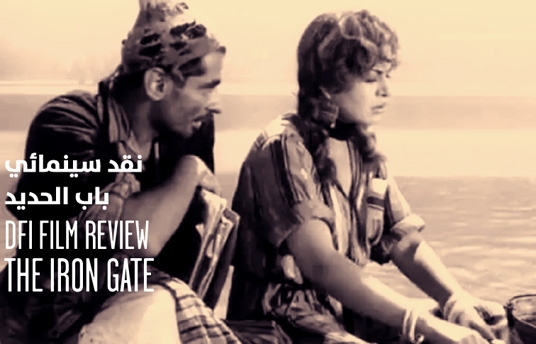DFI Film Review : Bab el hadid (1958)
Aug 28, 2011

Written by Reem Saleh, New Media, DFI
Film: Bab el hadid (Cairo Station or The Iron Gate)
Year: 1958
Director: Youssef Chahine
Stars: Farid Shawqi, Hind Rostom and Youssef Chahine
Genre: Drama, Romance, Art House & International
Set in the 1950’s, Youssef Chahine’s masterpiece (Bab el hadid) sketches a dark portrait of a deprived category of people, and set in one of the busiest locations of Cairo: the train station. The film tells the story of Qinawi (played by Chahine himself), a newspaper peddler obsessed with women. He falls in love with the most sensual of them all, Hanuma (Hind Rostom) who sells refreshments. Hanuma responds to his infatuation, but leaves him with false signs that ultimately drive him mad. At the same time, we discover, she is engaged to Abu Sri (Farid Shawqi), a sturdy man and the brave baggage carrier who leads a revolt against labor exploitation. In the midst of this love triangle, a number of subplots showcase Chahine’s poignant and daring views of his beloved society.
Choosing the Cairo train station as a primary location permits an ongoing depiction of reality from different angles in this micro cosmos of multicultural Egypt. It is more than a location; it is a statement to reflect upon with every passenger that marks a bright stand for a rebellious Chahine.
Every person who walks off a train leaves a story behind. The train station is Chahine’s mind and, these travelers are his ideas.. Some represent adultery, while others have better lessons to preach – like the group of feminists in the film giving speeches while wearing man-like suits. Abu Sid is investing his charismatic personality at the service of his-coworkers, demanding better job conditions. These undeveloped subplots are reflective of Egypt’s ideals at the time, and allow versatile samples of social movements that are not necessarily otherwise interrelated.
The point of the film is much darker. It revolves around those who live by the station leading a tough life. Some carry suitcases, others sell whatever they manage to come across, but they always seem to love life, which is a trademark of the Egyptian culture. The noisy railroad animates their days, and they became an integral part of its identity.
From this working class comes Qinawi, a physically challenged man, embraced by a merchant who felt pity for him. The merchant offers him a job and a place to sleep, and soon the walls of Qinawi’s room are covered with indecent posters of women. His obsession with women (one of the main themes of the film) is teased and provoked by the free-spirited Hanuma who uses her sensuality to vend drinks. She is a momentary pleasure to his senses, but unfortunately an unreachable goal as well. In a memorable scene evoking both the greats Fellini and Antonioni, Hanuma is placed in an all-men environment, dancing to the beats of Rock & Roll, and appeasing their thirst for both women and soda. She uses her femininity to the service of her job; dancing here, smiling there, while envious competitors know they can’t beat this sex appeal. Mesmerized by Hanuma, Qinawi forgets everyone around him and starts dancing hysterically, taking his energy boost from the slightest glance he gets from her. This scene is similar in its chauvinist portrayal to Antonioni’s L’Avventura in which a call girl is placed amongst hundreds of silly looking men, fight for just a glance. Hanuma, on the other hand, is aware of men’s obsession with her charms, and uses it to sell her merchandise, and to survive for a few more days!
Have a look at Chahine’s signature scene here:
‘Bab el Hadid’s is characterized by filming in one location with themes about the working class, which is a style of film adopted from Italian cinema’s neorealism, showcasing economic and moral struggles of the post WWII era. In this brilliant performance for both Chahine and the legendary Hind Rostom (aka Marilyn Monroe of the Middle East who sadly passed away two weeks ago), we are taught that morality resonates differently when physical and survival needs are not bestowed.
The train station is a silent witness and a carrier of tales. As we juggle between our main protagonists, Chahine feeds us with some of his preferred subjects that he return to in later films, including thoughts on Islamic fundamentalists, women’s rights, and labor conditions…all of which are the rising socialist themes of the Nasser era. This is the direct effect of a generation nourished by ideals that were later on dissimilated. The Egyptian filmmaker Khaled Youssef, spoke to DFI about Chahine’s political and social views.
Bab el Hadid placed Chahine at the top ranks of filmmakers. Not only is it one of his best achievements, it is also a thorough study on human nature and morality when people are reduced to their basic needs for survival. ‘Bab el hadid’ is the kind of pictures that remind us why Chahine wanted to make films in the first place, planting the first seeds of what will later on develop in his personality as a filmmaker.